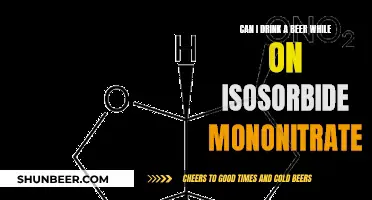
Allegra (fexofenadine) is a second-generation antihistamine used to treat allergy symptoms such as allergic rhinitis, hay fever, skin rashes, and the common cold. While it is generally advised to avoid drinking alcohol when taking any medication, including antihistamines, is it safe to mix alcohol and Allegra?
| Characteristics | Values |
|---|---|
| Is it safe to drink beer while taking Allegra? | It is not recommended to mix alcohol with antihistamines, including Allegra. However, second-generation antihistamines like Allegra are considered safer with alcohol than first-generation antihistamines, but caution is still advised as individual reactions may vary. |
| Why is it not recommended to mix alcohol with antihistamines? | Alcohol can intensify the side effects of antihistamines, including common side effects such as nausea, diarrhea, headaches, and muscle pain. Additionally, both alcohol and antihistamines can cause drowsiness, and combining them may lead to extreme drowsiness, impaired functioning, and an increased risk of accidents or injuries. |
| Are there any alternatives to avoid the interaction between alcohol and antihistamines? | Nasal corticosteroids like Flonase or Nasonex are recommended alternatives for those wishing to consume alcohol as they don't typically cause drowsiness or interact negatively with alcohol. |
| Are there any food interactions with Allegra? | Consuming large amounts of certain fruit juices, including grapefruit, orange, and apple juices, may decrease the levels of Allegra (fexofenadine) in the body. It is recommended to take Allegra with water and refrain from drinking large amounts of these juices to ensure better absorption of the medication. |
What You'll Learn
- Allegra is a second-generation antihistamine
- Alcohol is known to intensify the side effects of antihistamines
- Allegra is considered safer with alcohol than first-generation antihistamines
- It is best to consult a doctor before mixing Allegra and alcohol
- Consuming large amounts of certain fruit juices may decrease the levels of Allegra in your body

Allegra is a second-generation antihistamine
Allegra is the brand name for the drug fexofenadine, a second-generation antihistamine. Antihistamines are a class of drugs that help treat the symptoms of various allergies. Histamines are chemicals that are released in the body when exposed to an allergen, causing allergic reactions.
First-generation antihistamines became available in 1942 and are known for causing excessive drowsiness. They work by affecting the histamine receptors in the brain and spinal cord and crossing the blood-brain barrier. Some common first-generation antihistamines include Benadryl, Chlor-Trimeton, and Atarax.
Second-generation antihistamines, on the other hand, were developed in the 1980s and cause less sleepiness than their first-generation counterparts. They also interact better with other medications. In addition to fexofenadine (Allegra), other examples of second-generation antihistamines include loratadine (Claritin) and cetirizine (Zyrtec).
While second-generation antihistamines are considered safer when mixed with alcohol, it is still advised to exercise caution as individual reactions may vary. Alcohol is known to intensify the side effects of antihistamines, such as nausea, diarrhoea, headaches, and muscle pain. Therefore, it is generally recommended to avoid drinking alcohol when taking Allegra or any other antihistamine.
Beer on Treasure Island Beaches: What's Allowed?
You may want to see also

Alcohol is known to intensify the side effects of antihistamines
First-generation antihistamines, such as Benadryl, are known to cause excessive drowsiness and should never be mixed with alcohol. The combination can lead to severe drowsiness, impaired functioning, and an increased risk of accidents or unconsciousness.
Second-generation antihistamines, such as Allegra, are considered safer with alcohol but caution is still advised as individual reactions may vary. While these medications do not typically cause drowsiness, consuming alcohol can enhance their side effects, including nausea, diarrhea, headaches, and muscle pain. It is generally recommended to avoid alcohol completely when taking any antihistamine to avoid potential negative interactions.
If you are taking antihistamines and wish to consume alcohol, it is important to be aware of the potential risks and side effects. It is advisable to consult a healthcare professional to determine the best course of action and explore alternative treatment options, such as nasal corticosteroids, which do not typically interact negatively with alcohol.
Beer and Excedrin: Safe Mix or Not?
You may want to see also

Allegra is considered safer with alcohol than first-generation antihistamines
Allegra (fexofenadine) is a second-generation antihistamine. It is designed to help control allergy symptoms such as allergic rhinitis, hay fever, skin rashes, and the common cold. Antihistamines work by blocking the action of histamine, a chemical that triggers allergy symptoms such as a runny nose, itchy eyes, swelling, and hives.
First-generation antihistamines, such as Benadryl, are known to cause excessive drowsiness and should never be mixed with alcohol. This is because both first-generation antihistamines and alcohol have a primary side effect of drowsiness, and consuming both together can lead to a double dose of this side effect, impairing your ability to function and increasing the risk of accidents or unconsciousness.
On the other hand, second-generation antihistamines, including Allegra, are less likely to cause drowsiness. While it is still advisable to avoid alcohol when taking these medications, the combination is generally considered safer than with first-generation antihistamines. This is because second-generation antihistamines have a reduced or absent side effect of sleepiness, so the risk of extreme drowsiness when combined with alcohol is lower.
However, it is important to note that alcohol is known to intensify the side effects of antihistamines, including Allegra. Common side effects such as nausea, diarrhea, headaches, and muscle pain can become worse when consuming alcohol. Therefore, it is recommended to drink in moderation and only after you have been taking Allegra for several days to understand how it affects you. Additionally, older adults are at an increased risk of experiencing intensified side effects from the combination of alcohol and second-generation antihistamines.
In summary, while Allegra is considered safer with alcohol than first-generation antihistamines, it is still advisable to use caution and be aware of potential side effects.
Freezing Beer: Safe to Drink After Thawing?
You may want to see also

It is best to consult a doctor before mixing Allegra and alcohol
Allegra (fexofenadine) is a second-generation antihistamine used to treat allergy symptoms such as allergic rhinitis, hay fever, skin rashes, and the common cold. While Allegra is considered a safer option to take with alcohol compared to first-generation antihistamines, it is still advised to exercise caution as individual reactions may vary.
Alcohol is known to intensify the side effects of antihistamines, and consuming alcohol while taking Allegra may lead to worsened side effects such as nausea, diarrhoea, headaches, and muscle pain. Therefore, it is recommended to avoid drinking alcohol when taking Allegra to minimize the potential risk of adverse effects.
If you choose to consume alcohol while taking Allegra, it is important to drink in moderation and be aware of the potential for enhanced side effects. It is also advisable to wait several days after starting Allegra before drinking alcohol, as this allows you to understand the typical effects of the medication on your body.
Additionally, it is worth noting that consuming large amounts of certain fruit juices, such as grapefruit, orange, and apple juice, may decrease the levels of Allegra in your body. Therefore, it is recommended to take Allegra with water instead of these fruit juices.
In conclusion, while there may be a slightly lower risk associated with mixing Allegra and alcohol compared to first-generation antihistamines, it is always best to consult a doctor before combining any medication with alcohol. Individual variations in reactions can occur, and a doctor can provide personalized advice and recommendations based on your medical history and specific circumstances.
Beer and Ulcers: What You Need to Know
You may want to see also

Consuming large amounts of certain fruit juices may decrease the levels of Allegra in your body
Allegra (fexofenadine) is a non-drowsy antihistamine that is available over the counter. It is used to relieve allergy symptoms such as red, itchy, or watery eyes and itching of the nose, throat, or roof of the mouth. Antihistamines work by blocking the action of histamine, which is released by the immune system when it identifies allergens as dangerous intruders.
While Allegra is considered a safer option to take with alcohol than first-generation antihistamines, caution is still advised as individual reactions may vary. Alcohol is known to intensify the side effects of antihistamines, so it is best to avoid drinking alcohol when taking Allegra. Consuming large amounts of certain fruit juices, including grapefruit, orange, and apple juice, may also decrease the levels of Allegra in your body.
These fruit juices contain compounds, including one called naringin, that inhibit specialized receptors called organic anion transporting polypeptides (OATPs). OATP proteins help Allegra cross biological membranes that are otherwise impermeable to the drug. Inhibition of OATP activity reduces the absorption of Allegra, making the medicine less effective. Consumption of drinks with as little as 5% juice can inhibit OATPs, and taking Allegra with juice can reduce its absorption by up to 60%.
To avoid this interaction, it is recommended to refrain from drinking fruit juice within four hours before or one to two hours after taking Allegra. This will ensure that the juice does not significantly reduce the effectiveness of the medication. It is also important to note that the absorption-inhibiting compounds are present in whole fruit as well.
Beer and Sperm: What's the Connection?
You may want to see also
Frequently asked questions
It is not recommended to mix alcohol with antihistamines like Allegra. Alcohol is known to intensify the side effects of antihistamines, such as nausea, diarrhoea, headaches, and muscle pain.
Antihistamines are drugs used to treat allergic reactions caused by food, dust, pollen, mold, pet dander, insect bites, and other common allergens. They work by blocking the action of histamine, which is released by the immune system to fight off allergens, and can cause symptoms like a runny nose, itchy eyes, swelling, and hives.
Yes, nasal corticosteroids like Flonase or Nasonex are recommended alternatives for those wishing to consume alcohol. These medications do not typically cause drowsiness or interact negatively with alcohol.
Mixing alcohol with antihistamines can lead to serious problems with thinking, judgment, and motor skills. It can also impair your ability to function and increase the risk of accidents or injuries. Older adults are at an increased risk of experiencing these negative effects.







